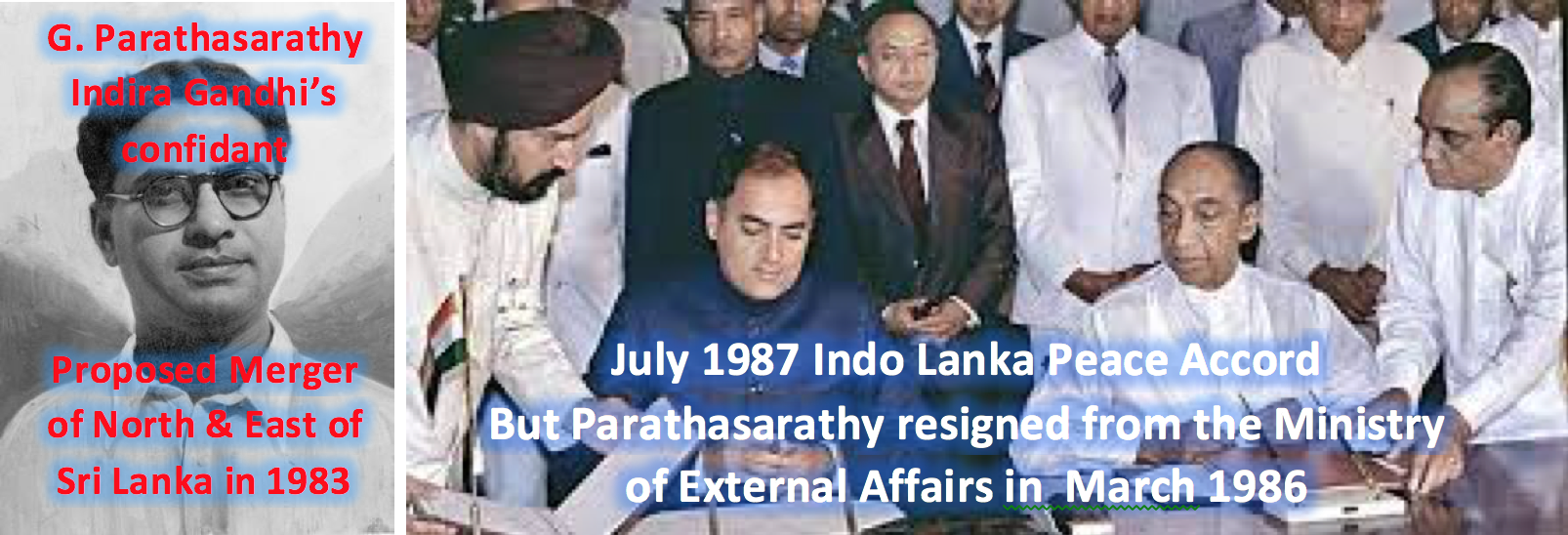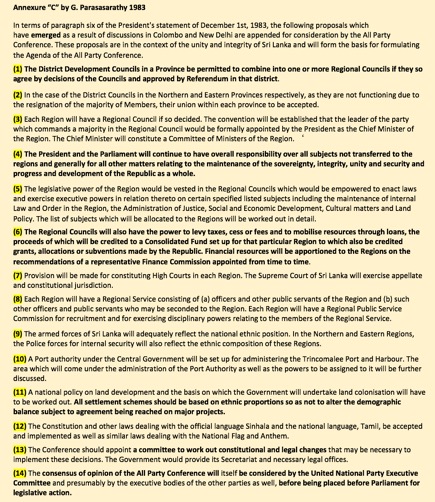Indo-Lanka Accord – 13th Amendment & India

Both Indo-Lanka Accord & 13thamendment are surrogates of India. Naturally, India will be too proud to find fault with what India imposed on Sri Lanka. Indo-Lanka Accord was signed in July 1987 while 13thamendment was passed as a domestic legislation in November 1987. All subjects have been devolved except Land & Police powers. India has to be fair only ‘insisted’ on full implementation but stopped short of doing any parippu drops because successive Sri Lankan Governments did not devolve land & police powers.
It is no exaggeration to say, India is not Mr. Popular amongst its neighbors. Sri Lanka in particular has trouble in developing or progressing because India does not wish Sri Lanka to prosper. This is a barrier and a headache that future generations in Sri Lanka cannot expect to be burdened with. Sri Lanka’s leaders too must learn to refrain from running off to India for the smallest reason. There are some who say we owe India – for what? On that same premise what do we owe China for all of its gifts to Sri Lanka without any bullying or internal interference?
For India to continue maintain its superiority in Asia, India must learn to stop poking its nose into the domestic affairs of all of its neighbors. Sri Lanka’s leaders too must be bold enough to take decisions without thinking their decisions will upset a nation! When leaders take decisions in the interest of the Nation, the people will defend the leaders and this defense is more powerful than any foreign army!
Letter sent by TULF to PMRajiv Gandhi dated 28 October 1987 confirms India birthed the 13thamendment, PC system & merger of North & East.
http://www.thesundayleader.lk/archive/20080217/issues.htm
The letter reveals the following
- TULF leaders were dissatisfied with 13a Bill & PC Bill
- TULF leaders claimed 13aBill & PC Bill did not meet Tamil aspirations
- This means India never intended to meet Tamil aspirations inspite of spending 4 years negotiating it (1983-1987) – This reveals 13a was negotiated far before Indo-Lanka Accord
- TULF in December 1985 proposed to combine North & East into a single Tamil linguistic state within a framework of “United Sri Lanka (Not Unitary) with India’s nod of approval. Probably this is being recycled for new constitution of 2020. Both want to removed UNITARY and replace with UNITED.
- In May/June 1986 India forwarded new proposals to devolve powers diluting UNITARY status of Sri Lanka – 13a with PC system created a quasi-federal Sri Lanka, one which India thought it could manipulate & maneuver to its advantage. The short-sightedness of Sri Lanka’s leaders resulted in blindly agreeing to diluting the unitary status of Sri Lanka. This was one example of GoSL following an appeasing policy
- If the constitution was being tweaked a Referendum was required. However,
- Indo-Lanka Accord does not refer to 13a or PCs.
- 13a & PCs was as a result of Annexure C proposed by G. Parthasarathy who was PM Indira Gandhi’s representative. He was given no role by Rajiv Gandhi.
- The 1984 “Annexure C” by Parthasarathy formed the basis for the Indo-Lanka Accord – the inputs of the People nor MPs were taken.
- 13a or Indo-Lanka Accord had no inputs from MPs or People – it was simply undemocratically drafted and implemented by force.

How was Indo-Lanka Accord signed?
- Under Emergency Law the Accord was signed on 29 July 1987
- Under Emergency the 13thamendment to Sri Lanka’s Constitution was passed on 14 November 1987 by Sri Lanka’s Parliament.
The Indo-Lanka Accord – on Devolution & Constitutional Amendment
- does not mention ‘devolution’
- does not mention ‘constitutional amendment’
The Indo-Lanka Accord – on North & East Provinces
- only mentions North & East provinces & a system for the 2 provinces only.
The Indo-Lanka Accord – violations by India
- India did not honor the clauses & created Tamil National Army
- signed under coercion
- India did not honor all 5 clauses India committed to in the Indo-Lanka Accord. This violation allows Sri Lanka to make void the agreement citing Pacta Sunt Servanda (Pacts have to be honored for an agreement to remain valid)
- India signed Indo-Lanka Accord claiming to solve the ‘ethnic problem’ but instead created a Tamil National Army recruiting local Tamils who were armed by IPKF to support Chief Minister Varatharaja Perumal.
- By creating and arming the Tamil National Army India violated the Indo-Lanka Accord and breached the assurance given to Sri Lanka to preserve the unity & sovereignty of Sri Lanka
- Clauses of Accord had nothing to do with the ‘ethnic problem’ – what has Trinco Port/Trinco Oil Tanks to do with a problem between Tamils & Sinhalese? Even LTTE did not demand Trinco Port of Trinco Oil Tanks. But India wanted both!
If Indo Lanka Accord has no mention of PC system, 13a or devolution there is absolutely no reason to not take action regarding 13a citing India’s objection.
13a was a domestically passed legislation. Sri Lanka is a sovereign country and Sri Lanka has every right to continue or do away with 13a. Sri Lanka does not need to take any permission from India whatsoever.
If the 2002 ceasefire agreement brokered by Norway to which India also played a major role was unilaterally annulled by GoSL – there is no reason why GoSL cannot do the same for the 1987 Indo-Lanka Accord.
India’s concern for Tamils has to be Tamils in India not Tamils who are citizens of Sri Lanka.
If Tamil citizens of Sri Lanka feel they are better looked after by India, then GoSL and India must facilitate a new repatriation system.
While it is also noteworthy that 36 of the 37 subjects have been devolved to the provinces but have the devolution given any benefit to the People?
It is natural that people wish to abolish its for the lack of success is evident in its over 30 years of operations. If with 36 subjects the PCs have failed how can demands for Police and Land Powers make it a success? If the other 7 provinces do not seek police and land powers, why should such be given to only 2 provinces?
What is also noteworthy is that India insisted Sri Lanka’s ports were not to be given to any external powers that would threaten India.With India now QUAD partner, India obviously does not now mind US in Trinco. But this was not the scenario in 1980s when the Accord was signed. Sri Lanka cannot be making friends and enemies simply because India changes friends and enemies.
The hypocrisies of India are too many to list. We cannot be changing friends to suit India’s whims and fancies. Sri Lanka’s leaders must learn to remain steadfast and the strength of resolve comes in the backing by the People, when Sri Lanka’s leaders are straightforward and honest in their foreign dealings putting COUNTRY FIRST before any other country.
Shenali D Waduge




